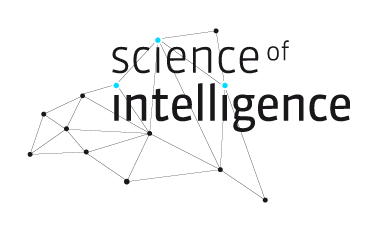Computational Psychology
at Technische Universität Berlin
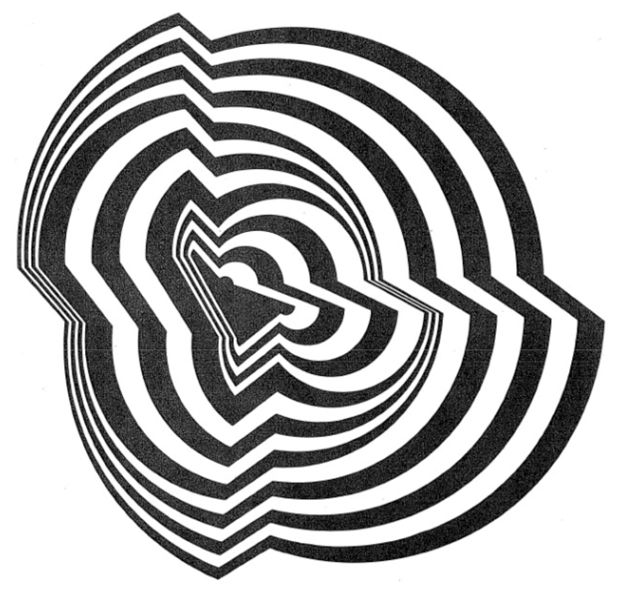
News
New group member: Noah Kogge
We are very happy to welcome our new group member Noah Kogge to our group. In his Bachelor thesis, Noah examines how spatial dimensionality influences perceptual structure, stability and consistency of similarity judgements combining behavioral data with quantitative metrics, to compare two- and three-dimensional representations.
Student Symposium in November 2025
Our BA-students Jan Z. , Jannis , Leila , Lennart , Linus, Matheo and Noah proudly present their theses work in our student symposium. If you want to know more about their exciting research topics join us on Friday, November 28th, from 10am-2pm in MAR 5.013. If you missed it you can check out the presentations under their names.
Lynn has successfully completed her PhD!
We are delighted that Lynn has successfully completed her PhD! Congratulations, Lynn!!!


We thank the committee members for their participation and stimulating discussion (from left to right: Prof. Guillermo Gallego (TU Berlin), Prof. Peter Neri (IIT Genova), Dr. Lynn Schmittwilken (TU Darmstadt), Prof. Marianne Maertens (TU Berlin), Prof. Thomas Wallis (TU Darmstadt), Prof. Felix Wichmann (Universität Tübingen)).
Lynn's PhD Defense on 09.10.2025 at 2 pm at MAR 2.057 and on Zoom and Symposium on 10.10.2025 at 9 am at MAR 2.057
We are very happy to share with you that Lynn will have her PhD Defense on “Seeing by moving: Revisiting pattern vision through fixational eye movements” on 09.10.2025 at 2 pm at MAR 2.057.
Join us at MAR 2.057 or on Zoom
On 10.10.2025 we will also have a Symposium related to Lynn's Phd Defense. Please find the program here
New group member: Inés Schönmann
We are very happy to welcome our new group member Inés Schönmann to our group. Inés joined us as a Ph.D. student. She focuses on studying human visual perception in a way that it reflects the realities of biological and behavioural data while also relating meaningfully to the human experience. Furthermore, she is interested in the role predictive processes play when processing language in naturalistic settings.
New group member: Lennart Lottermoser
We are very happy to welcome our new group member Lennart Lottermoser to our group. In his Bachelor thesis, Lennart studies how edge perception in real three-dimensional scenes differs from edge perception in two-dimensional photographic representations of a scene, using drawing tasks.
Lynn's and Marianne's paper "Ocular drift shakes the stationary view on pattern vision" has been published in Journal of Vision
Here you can find Lynn's and Marianne's paper on "Ocular drift shakes the stationary view on pattern vision". It has been published in Journal of Vision, July, 2025. You can also find it following this doi:10.1167/jov.25.8.17
New group members: Matheo Möbis and Jannis Röhl
We are very happy to welcome our new group members Matheo Möbis and Jannis Röhl to our group. Matheo is testing an algorithm that detects T-Junctions in images and examine how it behaves when confronted with noise in his Bachelor thesis. In his Bachelor thesis, Jannis relates discrimination with perceived magnitude on simultaneous brightness contrast displays in an experimental approach.
We will be at the ECVP 2025 in Mainz
Marianne , Guillermo , Lynn and Joris will be at the ECVP 2025 in Mainz !!!
Here you can find the program of the ECVP 2025
Lynn will give a talk on Wednesday, 27.08.2025 at 11:30 am: Lynn Schmittwilken, Anna. L. Haverkamp, & Marianne Maertens: "Quantifying human edge sensitivity in real-world tasks". This talk is part of the symposium "Individual differences in perceptual and sensorimotor processing: A look into real-world expertise", organized by Jolande Fooken and Alexander Goettker.
And our group will give two workshops! On the morning of Sunday, 24.08.2025 Lynn and Joris will give a workshop on stimupy, our python package for easy stimulus generation , and later in the afternoon Guillermo will give a workshop on MLDS and MLCM, two scaling methods to measure stimulus appearance .
We are excited to provide the talk and these workshops. See you at ECVP!
New group member: Jessica Schilling
We are very happy to welcome our new group member Jessica Schilling to our group. In her Bachelor thesis, Jessica examines the minimum number of pixels required for letters to be identifiable and to what extent contrast polarity influences this.
Student Symposium in February 2025
Our BA-students Yuri, Christian , Anna , Duc, Azer M , Ori and Konstantinos proudly present their theses work in our student symposium. If you want to know more about their exciting research topics join us on Friday, February 14th, from 9am-2pm in MAR 5.013. If you missed it you can check out the presentations under their names.
New group members: Christian Haase and Ori Toledo Cohen
We are very happy to welcome our new group members Christian Haase and Ori Toledo Cohen to our group. In his Bachelor thesis, Christian is building a prototype to study modal completion under occlusion, to answer whether partially occluded objects are perceived in the same way in a real environment as in the digital experiment and Ori investigates testing a unified framework for perceived magnitude and integrated sensitivity in White’s Illusion in his Bachelor thesis.
Jesus’, José's, Guillermo's, Marianne's and Felix' paper "Estimating the contribution of early and late noise in vision from psychophysical data" has been published in Journal of Vision
Here you can find Jesus', José's, Guillermo's, Marianne's and Felix' paper on "Estimating the contribution of early and late noise in vision from psychophysical data". It has been published in Journal of Vision, January, 2025. You can also find it following this doi:10.1167/jov.25.1.12 .
New group members: Yury Besiakov and Anna Haverkamp
We are very happy to welcome our new group members Yury Besiakov and Anna Haverkamp to our group. In his Bachelor thesis, Yury investigates Model Predictions: Parametric and stimuli category Influence on ODOG, LODOG, and FLODOG. Anna investigates whether the presumed mechanisms underlying human edge perception translate to natural images in her Master thesis.
Joris’, Marianne's and Guillermo's paper "What Fechner could not do: Separating perceptual encoding and decoding with difference scaling" has been published in Journal of Vision
Here you can find Joris', Marianne's and Guillermo's paper on "What Fechner could not do: Separating perceptual encoding and decoding with difference scaling". It has been published in Journal of Vision, May, 2024. You can also find it following this doi:10.1167/jov.24.5.5 .
Lynn’s, Felix' and Marianne's paper "Standard models of spatial vision mispredict edge sensitivity at low spatial frequencies" has been published in Vision Research
Here you can find Lynn’s, Felix' and Marianne's paper on "Standard models of spatial vision mispredict edge sensitivity at low spatial frequencies". It has been published in Vision Research, 222, 2024. You can also find it following this doi .
New group members: Hannah Boldt, Sebastian Keil, Duc Phan Anh Le, Azer Mahjoub, Yiran Sun, Rhea Widmer and Konstantinos Zamanis
We are very happy to welcome our new group members Hannah Boldt , Sebastian Keil , Duc Phan Anh Le , Azer Mahjoub , Yiran Sun , Rhea Widmer and Konstantinos Zamanis to our group. In her Bachelor thesis, Hannah investigates at which point does noise masking cause a layer scission. In his Bachelor thesis, Sebastian studies two models of brightness perception - ODOG and BIWaM. The focus is to identify the differences between them. Duc investigates the noise masks’ effectivity in Großmann’s experiments on edge detection in his Bachelor thesis. Azer studies Weather's Cinematic Influence: Analyzing the Genre Preferences in his Bachelor thesis. In his Bachelor thesis, Yiran investigates edge detection in natural images under various noise masks using a spatiotemporal model. Rhea studies improving trial selection for maximum likelihood conjoint measurement for psychophysical experiments in her Bachelor thesis. In his Bachelor thesis, Konstantinos studies monitor calibration with unstable gamma function due to temperature dependency.
Student Symposium in June 2024
Our BA-students Hannah , Tim H., Tim S. , Philip , Clara , Daniel , Sebastian and Azer proudly present their theses work in our student symposium. If you want to know more about their exciting research topics join us on Friday, June 21, from 9am-3pm in MAR 5.013. If you missed it you can check out the presentations under their names.
New group members: Philip Brozicevic, Daniel Castro Sanchez and Tim Henze
We are very happy to welcome our new group members Philip Brozicevic , Daniel Castro Sanchez and Tim Henze to our group. In his Bachelor thesis, Philip investigates to what extent contour segmentations of different observers are consistent and what role the type of noise plays in this. Daniel studies the investigation of brightness contrast perception: A comparison between e- and traditional paper and monitors in his Bachelor thesis. Tim studies frequency manipulation in complex images and evaluate an algorithm from Marius Krause's bachelor's thesis for controlling image contrast in his Bachelor thesis.
Teaching at the Summer School 15th Advanced Scientific Programming in Python 2023

Guillermo taught this August in the Summer School 15th Advanced Scientific Programming in Python (ASPP), in Heraklion, Greece. He lectured on the best practices of data visualization, and on advanced numpy, the most used library for scientific computing in python. The school was a success, hosting 30 students around Europe from diverse scientific disciplines.
Teaching at the 1st Advanced Scientific Programming in Python – Latin America 2023
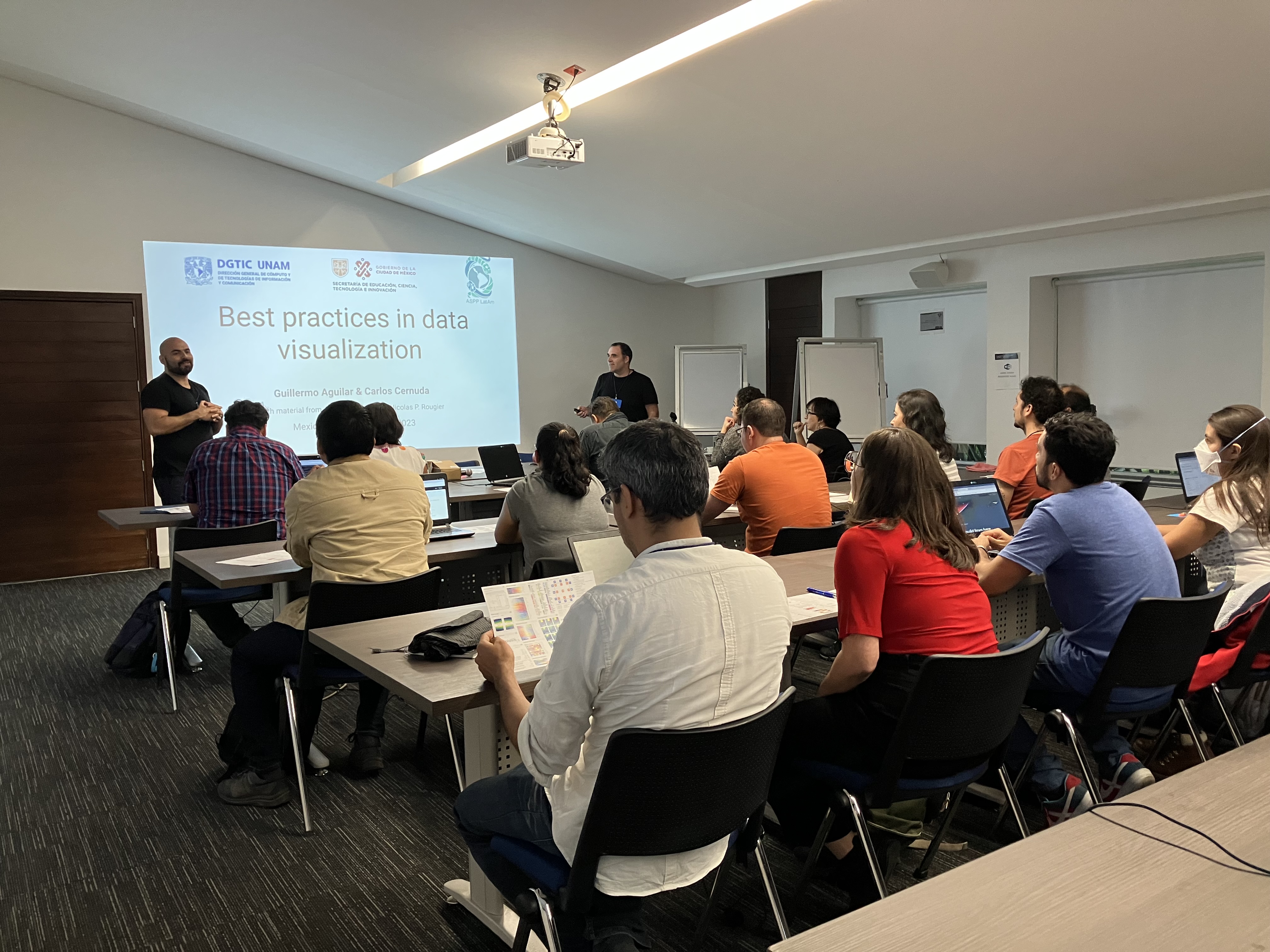
Guillermo participated as tutor in the 1ˢᵗ Advanced Scientific Programming in Python (ASPP) - Latin America 2023, in Mexico City. The school taught a selection of advanced programming techniques and best practices to scientists who do not have formal training in programming. Specifically, he lectured on best practices of data visualization and advanced numpy. You can find more information in the school's website here . And here you can find a written news article about the school (in Spanish) .
Student Symposium in June 2023
We are happy that we had our BA student symposium in the middle of the summer semester! Our BA candidates Ji , Hafidz , Felix , Lisa and Jan presented their diverse set of research questions and we were happy to see their progress.
Annual meeting of the Vision Science Society 2023
We proudly presented stimupy - a Python package for creating stimuli in vision science. If you want to know more about it, check our paper .
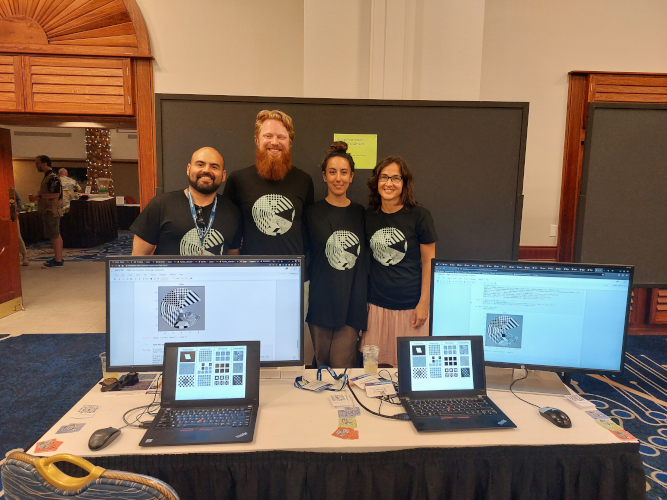
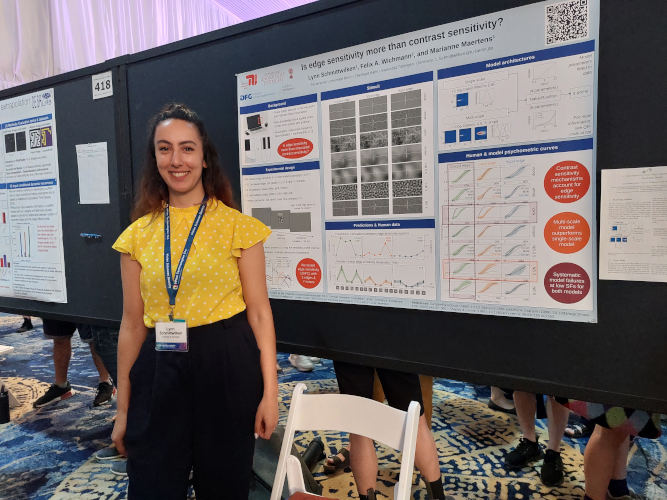
Marianne , Guillermo , Lynn and Joris presented our work at MODVIS and VSS 2023!!
- Lynn & Marianne: Extracting Edges in Space and Time During Visual Fixations
- Joris & Marianne: Separate normalization of ON / OFF channels is not enough to account for perceived brightness
- Guillermo, Jakob & Marianne: Optimizing data acquisition for MLDS: when is it valid to take a short-cut?
- Lynn, Felix & Marianne: Is edge sensitivity more than contrast sensitivity?
New group members: Hafidz Arifin, Felix Dexel, Ji Hyea Park, Lisa Scheibner, Jarl-Sebastian Sorensen and Jan Zabel
We are very happy to welcome our new group members Hafidz Arifin , Felix Dexel , Ji Hyea Park , Lisa Scheibner , Jarl-Sebastian Sorensen and Jan Zabel to our group. In his Bachelor thesis, Hafidz focuses on two different methods to study human brightness perception - method of adjustment and brightness ratings. Felix studies how the brightness of surfaces is represented in the brain in his Bachelor thesis. In her Bachelor thesis, Ji Hyea studies the difference between real and computer-generated stimuli in the domain of lightness perception. Lisa studies in her Bachelor thesis what perceptual scales for simultaneous brightness contrast look like and how to compare them with those of White's effect. Jarl workes with us as a Student research assistant. He studies the influence of noise on human edge perception in natural images and Jan studies how to optimize data acquisition for scaling methods, in particular for MLCM in his Bachelor thesis.
Student Symposium in January 2023
We are happy to finish the winter semester with our BA student symposium! Our BA candidates Savas , Sam , Marius, Marc and Filipe presented their diverse set of research questions and we were happy to see their progress.
New group members: Filipe Borges, Sam Chamani, Savas Großmann, Marius Krause, Karol Rogoza and Marc Tukendorf
We are very happy to welcome our new group members Filipe Borges , Sam Chamani , Savas Großmann , Marius Krause , Karol Rogoza and Marc Tukendorf to our group. In his Bachelor thesis, Filipe studies surface segmentation through adaptation. Sam studies perception of transparency and contrast in variegated checkerboards with transparent media of low luminance values in his Bachelor thesis. In his Bachelor thesis, Savas studies if the human visual system is more sensitive to edges or luminance differences and if we do get similar results from experiments on these two stimuli. In his Bachelor thesis, Karol studies visual perception of depth through different illuminations of 3d generated scenes on the computer screen. And Marc focuses on replicability and reproducibility: Translating and evaluating a camouflage detection algorithm in his Bachelor thesis.
Marianne’s and Lynn’s paper "Fixational eye movements enable robust edge detection" has been published in Journal of Vision (JOV)
Here you can find Marianne’s and Lynn’s paper on "Fixational eye movements enable robust edge detection". It has been published in Journal of Vision (JOV).
Student Symposium in July 2022
We are happy to finish the summer semester with our BA student symposium! Our BA candidates Anas , Enis , Marius, Karol, Eduardo, Hendrik and Jarl presented their diverse set of research questions and we were happy to see their progress.
New group members: Burak Kiran, Iris Özkaya, Eduardo Luiz Rhein and Enis Can Simsek
We are very happy to welcome our new group members Burak Kiran , Iris Özkaya , Eduardo Luiz Rhein and Enis Can Simsek to our group. In his Bachelor thesis, Burak will focus on the relationship between discrimination and scaling methods in the domain of contrast perception. In her Bachelor thesis, Iris studies the effect of background contrast on perceived contrast and perceived transparency. In his Bachelor thesis, Eduardo studies implementing and analyzing content-adaptive subsampling for image compression. Enis studies contrast constancy with supra-threshold contrast using MLCM in his Bachelor thesis.
MODVIS 2022
Marianne , Guillermo and Joris have attended MODVIS 2022!! Here you can find Marianne’s, Guillermo’s and Joris’ talk on "Constraining computational models of brightness perception: what’s the right psychophysical data?" And here you can find the slides .
Preprint of Marianne’s and Lynn’s paper "Fixational eye movements enable robust edge detection" (will be published soon in JOV)
Here you can find the preprint of Marianne’s and Lynn’s paper on "Fixational eye movements enable robust edge detection". It will be published soon in Journal of Vision (JOV).
Annual meeting of the Vision Science Society 2022
Marianne , Guillermo , Lynn and Joris have attended the VSS annual meeting 2022!! Here you can find Marianne’s, Guillermo’s and Joris’ poster and here is Marianne’s and Lynn’s poster .
Codary job advertisement
The TU alumni startup Codary is currently looking for motivated students (Werkstudenten) to teach children programming online. The position can be done completely remotely and the hourly wage is 13EUR/h. More information can be found here .
New group members: Jarl-Sebastian Soerensen, Hendrik Schulze Bröring and Anas Allaham
We are very happy to welcome our new group members Jarl-Sebastian Soerensen , Hendrik Schulze Bröring and Anas Allaham to our group. In his Bachelor thesis, Jarl wants to investigate the influence of noise on human edge perception in natural images. Hendrik explores in his Bachelor thesis how size reduction of input stimuli affects the output of multiscale spatial filtering models. In his Bachelor thesis, Anas focuses on the study of brightness and its entangled relationship with perceptual phenomena in a practical setting.
New publication in Journal of Vision
Marianne's and Guillermo's paper entitled "Conjoint measurement of perceived transparency and perceived contrast in variegated checkerboards" was published in the February's 2022 issue of Journal of Vision. You can find it following this link.
New group members: Yasin Mehmet Cifci, Poulami Ghosh, Jakob Grünwald, Tom Ravid Hausmann, Marie-Elisabeth Makohl and Annalena Katharina Schillen
We are very happy to welcome our new group members Yasin Mehmet Cifci , Poulami Ghosh , Jakob Grünwald , Tom Ravid Hausmann , Marie-Elisabeth Makohl and Annalena Katharina Schillen to our group. Yasin Mehmet works for us as a Student research assistant. He works on brightness perception models. Poulami is a Master student. As part of her lab rotation she does experiment to investigate whether human brightness perception can be done with online experimental tools. Jakob is a Bachelor student. In his Internship Jakob studies stochastic dependencies in scaling methods, in particular MLDS. Ravid is a Bachelor student. He works on expanding and refactoring the multyscale package for greater transparency in brightness perception modelling. Marie-Elisabeth works for us as a Student research assistant. She studies easy evaluation and comparison of brightness perception models. Annalena is a Bachelor student.
Nov, 4, 2021: Teaching live again!!! TU students are the best ;-)
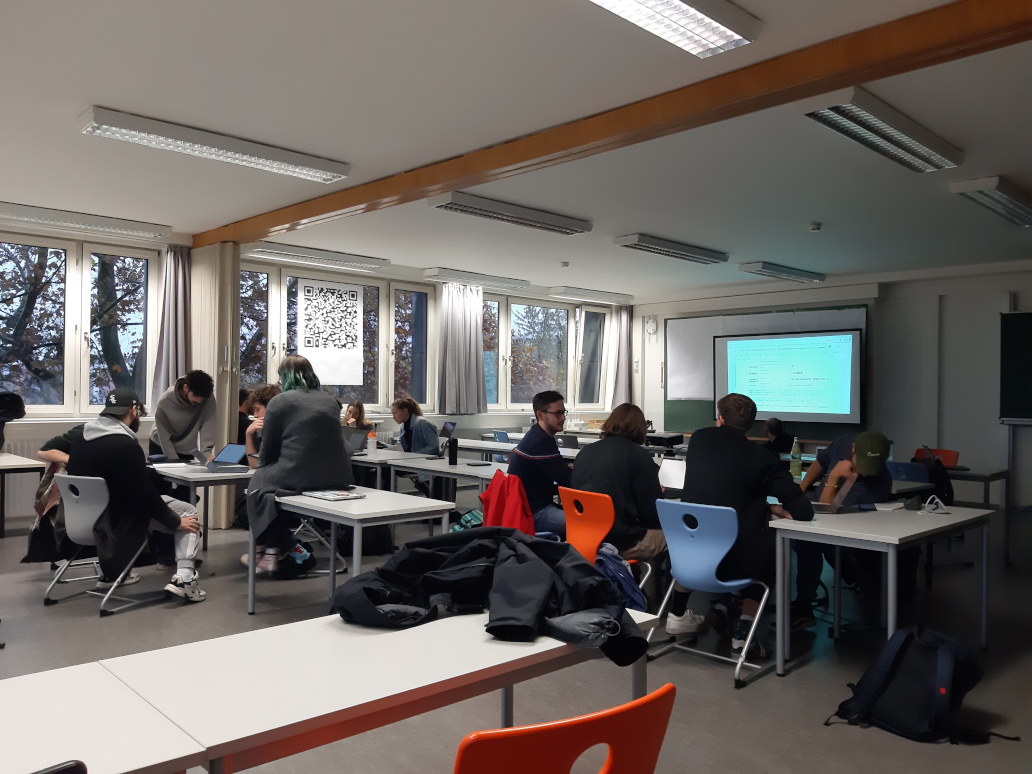
We congratulate Lynn for winning the ECVP 2021 poster award
We are happy to congratulate Lynn that the ECVP 2021 poster award sponsored by PeerJ goes to Lynn for her work entitled "An active model of human edge sensitivity: Extracting edges via fixational eye movements". You can find Lynn's poster here Please find here the blog post, i.e. the interview with Lynn
ECVP 2021
Joris Lynn and Matko are happy to present their posters at virtual ECVP 2021!! Here you can find Joris poster and You can find Lynn's poster here and Matko's poster here
New group member: Nico Kestel
On June 2021, Nico Kestel joined us in our group. In his Bachelor thesis, Nico wants to explore how CNNs might benefit from using dynamic images derived from fixational eye movements instead of static images to recognize objects in naturalistic scenes.
PsyCo goes Lange Nacht der Wissenschaften!
Interested in a fun evening with Science of Intelligence as part of the Lange Nacht der Wissenschaften 2021? Then sign up here for the Science Pub Quiz this Saturday, June 5th from 7.30-10 pm!
What is intelligence? Do beets float in water? Why should you pet your basil? Aravind Battaje and our lab member Lynn Schmittwilken will tell us about their latest research and answer your most burning questions about how humans and computers can perceive the world. The event will be held in English and German and is aimed at scientists and non-scientists alike. We are looking forward to seeing you!
Annual meeting of the Vision Science Society 2021
Joris Lynn Marianne and Max are happy to present their posters at virtual VSS!! We are looking forward to the annual meeting of the Vision Science Society! Here you can find Joris poster and here is Lynn’s poster and Marianne’s and Max poster
New group member: Wenwen Zhang
On April 2021, Wenwen Zhang joined us in our group. Wenwen studies the relationship between apparent contrast (supra-threshold discriminability) and contrast sensitivity (contrast discrimination thresholds) in human observers in her Bachelor thesis.
Carolin Brunn sucessfully defended her Bachelor thesis
We congratulate Carolin Brunn!! She successfully defended her Bachelor thesis on The Crispening Effect: An Artefact of a Method or a Feature of the visual System and moves on to her Master studies in Computer Science and to teaching computing to students. For more information about the program please click here
New group members: Amanda Maiwald, Christian Wohlhaupt and Matti Zinke
On April 2021, Amanda Maiwald Christian Wohlhaupt and Matti Zinke joined us in our group. Amanda explores gamification in the context of programming education in her Master thesis. Christian researches in his Bachelor thesis potential differences in the aesthetic perception of sunset-pictures by people of different geographic origin for marketing purposes. Matti Zinke is a Bachelor student at the TU Berlin.
PsyCo goes Girls' Day!
Have you ever wondered what the everyday worklife of a vision scientist might look like? One of our lab members, Lynn Schmittwilken, will talk about exactly this topic with a group of young girls during this year's Girls' Day on 22 April 2021 to encourage more girls to become vision scientists. For more information about the event, have a look here !
New group member: Marcus Bindermann
On April 2021, Marcus Bindermann joined us in our group to work on his Bachelor thesis project. Marcus is a Bachelor student in Computer Sciences at the TU Berlin.
Lynn Schmittwilken has been awarded a 2021 FoVea Travel and Networking Award!
We are happy to congratulate our lab member, Lynn Schmittwilken, for being awarded a 2021 FoVea Travel and Networking Award !
On 18 March 2021, Scholar Minds will talk about "Becoming aware through mindfulness" during the Brain Awareness Week 2021.
On Thursday, 18th of March, at 5pm Scholar Minds invites you to an online event about mindfulness and mental helath during the doctorate. Scholar Minds is a PhD initiative based in Berlin with the mission to help other PhD students to achieve a better mental health and work-life balance. Pursuing a doctorate is an exceptional time with great opportunities like investigating a phenomenon no one ever did before or discussing your research with new people from all over the world. But are you aware that this exceptional time also harbors exceptional dangers to your mental health? Are you aware that you as a PhD student are six times more likely to suffer from anxiety and depression? During the event, we will talk about mental health struggles related to the doctorate and introduce you to a tool to become more resilient: mindfulness. Mindfulness is a simple meditation tool that can help you to increase your mental well-being.
During the event, the mindfulness expert Dr. Simon Guendelman will present the concept of mindfulness and latest findings from (neuroscientific) research. On top, he will take us onto a little journey to become more aware about ourselves through mindfulness.
Register here: https://forms.gle/YpwcfRBkGGxy6Yhu5
New group member: Matko Matic
On March 2021, Matko Matic joined us in our group. Matko is a Master student in Information Systems and Signal Processing at KU Leuven. Currently, he is doing an Erasmus at the TU Berlin. He will support us as a research assistant (HiWi).
On 26 November 2020, Professor Michele Rucci (University of Rochester) gave a talk at the SCIoI Distinguished Lecture Series.
Establishing a representation of space is a major goal of sensory systems. Spatial information, however, is not always explicit in the incoming sensory signals. In most modalities it needs to be actively extracted from cues embedded in the temporal flow of receptor activation. Vision, on the other hand, starts with a sophisticated optical imaging system that explicitly preserves spatial information on the retina. This may lead to the assumption that vision is predominantly a passive spatial process: all that is needed is to transmit the retinal image to the cortex, like uploading a digital photograph, to establish a spatial map of the world. However, this deceptively simple analogy is inconsistent with theoretical models and experiments that study visual processing in the context of normal motor behavior. In his talk, Michele argued that, as with other senses, vision relies heavily on sensorimotor strategies to extract and represent spatial information in the temporal domain.
You can find an overview on his scientific work here
Yiqun Xiao sucessfully defended Master thesis

We congratulate Yiqun Xiao!! She successfully defended her Master thesis titled "Perceived Contrast in Variegated Checkerboards". In her thesis she studied the contrast-contrast effect (Chubb, Sperling & Solomon, 1990) in variegated checkerboards (left image) and compared it to the original effect (right image). Click here if you want to find out more details about her work.
Codary Project
We congratulate Amanda, Antonia & Nikolaj that their project Codary is supported by one of the coveted Berlin Startup Scholarships since October 2020. Codary is based at the Centre for Entrepreneurship at the Technische Universität Berlin.
New publication in Journal of Vision
Marianne's and Guillermo's paper entitled "Towards reliable measurements of perceptual scales in multiple contexts" has published in the April's 2020 issue of Journal of Vision. You can find it following this link.
New group member: Maximilian Pohlmann
On March 2020 Maximilian Pohlmann. joined us in our group. Maximilian is a Bachelor student and will support us as a research assistant (HiWi).
On 12 December 2019, Professor William H. Warren (Brown University) kicked off the SCIoI Distinguished Lecture Series.
William Warren earned his undergraduate degree at Hampshire College (1976), his Ph.D. in Experimental Psychology from the University of Connecticut (1982), did post-doctoral work at the University of Edinburgh, and has been a professor at Brown ever since.
His research focuses on the visual control of action – in particular, human locomotion and navigation. On the one hand, he wants to understand how motor behavior such as gait and other rhythmic movements are dynamically organized. On the other, he seeks to explain how such behavior is adaptively regulated by visual information in complex environments. Using virtual reality techniques, William H. Warren's research team investigates problems such as the visual control of steering, obstacle avoidance, pedestrian interactions, and collective crowd behavior.
New group members: Joris Vincent, Lynn Schmittwilken, Bernhard Lang and Bianca del Mestre
On November Joris joined us in our group. Joris joined us as a Post-doc. He is from the University of Pennsylvania, Dept. of Neurology. His contact details can be found in People.
On October three new members joined us in our group. Lynn joined us as a Ph.D. student, and she is part of the Science of Intelligence's Doctoral Programm. Bernhard is co-supervised as a Ph.D. student in our lab. And Bianca is our new secretary. Their contact details can be found in People.
ECVP19: we organized a Symposium and contributed with a talk
Marianne Maertens co-organized the Symposium Maximum Likelihood Difference Scaling (MLDS): Applications and challenges for the European Conference on Visual Perception (ECVP) held last August in Leuven, Belgium. One of the five talks was given by Guillermo Aguilar with the title "Lightness scales measured with MLDS and MLCM in multiple contexts". The abstracts can be found here.



